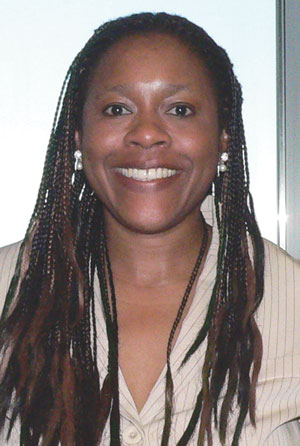Toronto lawyer Sandra Thomas has fostered her passion for community service with a commitment to improving the lot of visible minorities in the legal profession, and will soon be recognized by the Law Society of Upper Canada for her work.

Thomas credits her father, Dr. Ferdinand Thomas, for sparking her interest in giving back to the community. Dr. Thomas developed a successful medical practice in Scarborough after arriving in Canada in 1955 from Trinidad and Tobago.
He also had a keen interest in community service and was a mentor for many, she adds.
“He was always helping people in one way or another, whether it be to recommend somebody for a job or to put in a good word for somebody, or whatever,” says Thomas. “That’s how I was raised, pretty much.”
Thomas began following her father’s example while receiving her undergraduate degree at York University, when she put on cultural shows to raise funds for charity.
More recently, Thomas has become involved with the York-Westview Partnership at York’s faculty of education. The co-operative project involves the Toronto District School Board’s Westview family of schools and the education faculty, along with other smaller contributors.
The partnership offers a variety of programs, such as a weekend literacy and leadership program.
She also donates her time to the Youth Association for Academics Athletics and Character Education, which also assists young persons in the Jane-Finch area. That group encourages children in the community to continue their education, and includes both tutorial and athletic components.
Thomas combined her “abiding love for music” with her dedication to those organizations by organizing a recent fundraiser at Toronto’s Drake Hotel.
Jazz at the Drake featured a long list of local and international musicians, a photography exhibit by Thomas’ lawyer colleague at the Public Prosecution Service of Canada, Nick Devlin, and silent auction, raising $4,200 along the way.
It’s this kind of work in community service that has prompted the LSUC to honour Thomas with the Lincoln M. Alexander Award, which goes to a lawyer who has shown a commitment to the public through community service. It’s also, she says, the underlying reason she got into the profession.
“I wanted to do law because I saw an opportunity for me to continue on in some way with community service, regardless of what area I happen to end up in,” she says.
She ended up receiving her law degree from Rutgers University in New Jersey. Thomas went on to spend three years working at the Governor’s Office of the Council of the Governor of New Jersey, acting as an assistant counsel.
She returned to Toronto in 1989 and received her accreditation from the law society to practise here, and articled at McCarthy Tétrault LLP. She then spent a year in insurance defence work, before spending a year working as a duty counsel.
She eventually ended up where she’d hoped to be, working for the government at the Public Prosecution Service of Canada’s Toronto office. She’s been there ever since.
She currently works on the prosecution service’s revenue prosecutions team, which involves tax prosecutions under the Income Tax Act, Excise Tax Act, along with some white-collar fraud prosecutions.
Aside from her work on the job, Thomas has made her mark on the profession as founding president of the Canadian Association of Black Lawyers, which was created in 1996.
She says the organization came about because black lawyers felt the need for an organization that combined the promotion of excellence within the profession with the establishment of support systems for lawyers, law students, and others interested in becoming a lawyer.
“We thought that would be a way to encourage those who are currently practising, as well as those who would like to practise law,” she says.
The group also wanted to highlight positive role models for youths, and honour the contributions of successful black lawyers.
“We felt that there was a need for a national organization,” she says.
She notes that the government, law society, and various institutions and organizations have sought CABL’s advice on public policy issues.
“It provides another voice, for instance, in terms of diversifying the legal profession,” says Thomas. “It allows for others to contribute to the legal profession, and also to contribute not only their talent but also their opinions, where it counts.”
Thomas was involved with the Justice Department’s advisory committee on visible minorities in the late 1990s. That group aimed to give advice to the deputy minister on issues that are important to visible minorities in the department. It also sought to encourage the hiring, retention, and promotion of visible minorities within the department.
The experience allowed Thomas to travel to Ottawa, where she says she got a new perspective on the various policy issues the government faced.
“We felt that we had a contribution to make,” she says.
Thomas says she is extremely honoured to receive the award for her community service, and hopes she serves as an example for others with ambitions of making similar contributions.
“I hope that my doing community work would inspire others to do similar things,” she says. “One person can affect a lot of people - you may not think that you really have an impact, but you’d be surprised.”

 Thomas credits her father, Dr. Ferdinand Thomas, for sparking her interest in giving back to the community. Dr. Thomas developed a successful medical practice in Scarborough after arriving in Canada in 1955 from Trinidad and Tobago.
Thomas credits her father, Dr. Ferdinand Thomas, for sparking her interest in giving back to the community. Dr. Thomas developed a successful medical practice in Scarborough after arriving in Canada in 1955 from Trinidad and Tobago.